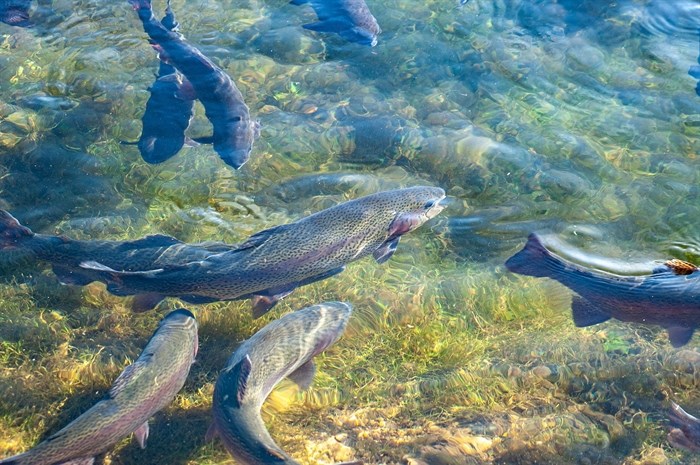
FILE PHOTO - Rainbow trout
Image Credit: PIXABAY
February 17, 2021 - 12:00 PM
A fish sound professor says there are lots to be learned from Okanagan Lake fish farts — yes, farts — as their passing of gas may be a marker for researchers to track specific species or used as a form of fish communication.
Rodney Rountree, an adjunct professor at the University of Victoria who has studied the soundscapes of fish habitats primarily on the East Coast, has been studying fish sounds, including passing gas, for more than 10 years.
While more research needs to be done to understand how certain species of fish fart, like rainbow trout, burbot (freshwater lingcod) and Atlantic salmon, Rountree said the farts could possibly be used as a tool of communication, or to scare off predators and Okanagan Lake fish are “absolutely” making these noises.
There are several theories on how the fish make the farting sound. Some researchers believe the farts are made with the passing of bubbles, but Rountree is leaning leaning towards the theory that these sounds are created internally as he’s watched fish pass gas without making a sound.
Pacific and Atlantic Herring are believed to use that fart sound as a communication form as they appear to be doing it voluntarily, he said.
READ MORE: Invasive shrimp in Okanagan Lake still an issue after 50 years
Some farts are created using a low enough frequency that it’s possible they can be heard by other fish. It’s also possible that even if the fish can’t hear the sound, it could be advantageous to use to avoid predators, he said.
“You make a rapid movement at the same time you make this sound, it might help you avoid a predator,” he said.
While it’s still unknown if trout and salmon are farting unintentionally or if they use it for communication, if that sound is unique it can still be used as a tool to monitor the fish’s behaviour, Rountree said.
The fish he’s been researching make distinctive sounds between species and monitoring fish farts also gives researchers the ability to track different types of fish, which is less invasive than having to put nets in the water, he said.
Soundscape research can also be used to determine the impact of human-generated noises on the animals of Okanagan Lake, Rountree said.
“It’s very important to remember that the soundscape is important for all fish, even if they’re not very vocal, they need to listen to their environment (to find prey, avoid predators and navigate their environment)... You know that if you’re standing in a busy city street and there’s a jackhammer going off next to you, it’s hard for you to communicate and you might not hear that car pulling up behind you… so sound can be very important.”
READ MORE: Noise that vibrates Earth dropped drastically after COVID-19 restrictions: study
Many freshwater systems are being strongly impacted by noise. Kelowna’s population is expected to increase by 50,000 over the next 20 years which Rountree said is concerning considering the noise impact for aquatic life.
“A lot of these landlocked systems, like ponds and lakes are even more susceptible to noise because even a boat in the middle of the lake (broadcasts sounds) in all different directions,” he said. “There’s more and more evidence now, that even in freshwater systems that animals are trying to compensate for all this noise.”
In some places, fish began to make louder noises, or become louder at night when cities become quieter, he said.
“It’s one more stressor on the system… and it could be the straw that breaks the camel’s back.”
In places with growing populations, it’s a shame there isn’t data prior, but as areas continue to develop, it will no doubt impact the soundscape of the lake, he said.
At the University of Victoria, soundscape work is being conducted on marine wildlife, and it's an upcoming field for other parts of B.C., he said.
Hear some unusual fish sounds for yourself by visiting Rountree's website.
— This story was originally published at 8 a.m. Feb. 24, 2021.
To contact a reporter for this story, email Carli Berry or call 250-864-7494 or email the editor. You can also submit photos, videos or news tips to the newsroom and be entered to win a monthly prize draw.
We welcome your comments and opinions on our stories but play nice. We won't censor or delete comments unless they contain off-topic statements or links, unnecessary vulgarity, false facts, spam or obviously fake profiles. If you have any concerns about what you see in comments, email the editor in the link above.
News from © iNFOnews, 2021